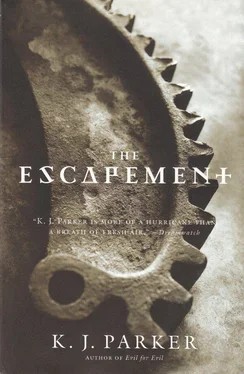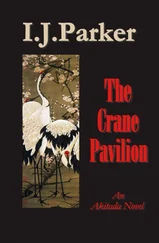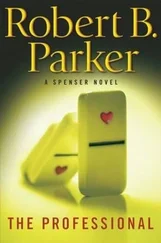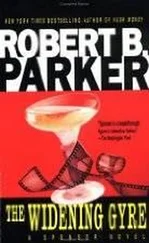K Parker - The Escapement
Здесь есть возможность читать онлайн «K Parker - The Escapement» весь текст электронной книги совершенно бесплатно (целиком полную версию без сокращений). В некоторых случаях можно слушать аудио, скачать через торрент в формате fb2 и присутствует краткое содержание. Жанр: Фэнтези, на английском языке. Описание произведения, (предисловие) а так же отзывы посетителей доступны на портале библиотеки ЛибКат.
- Название:The Escapement
- Автор:
- Жанр:
- Год:неизвестен
- ISBN:нет данных
- Рейтинг книги:4 / 5. Голосов: 1
-
Избранное:Добавить в избранное
- Отзывы:
-
Ваша оценка:
- 80
- 1
- 2
- 3
- 4
- 5
The Escapement: краткое содержание, описание и аннотация
Предлагаем к чтению аннотацию, описание, краткое содержание или предисловие (зависит от того, что написал сам автор книги «The Escapement»). Если вы не нашли необходимую информацию о книге — напишите в комментариях, мы постараемся отыскать её.
The Escapement — читать онлайн бесплатно полную книгу (весь текст) целиком
Ниже представлен текст книги, разбитый по страницам. Система сохранения места последней прочитанной страницы, позволяет с удобством читать онлайн бесплатно книгу «The Escapement», без необходимости каждый раз заново искать на чём Вы остановились. Поставьте закладку, и сможете в любой момент перейти на страницу, на которой закончили чтение.
Интервал:
Закладка:
If you can be induced to betray them, we stand some kind of chance of beating them, winning the war and saving the City. I say "we"; at some level, I regard you as a potential ally as much as an enemy, which brings me on to my next point.
He shook his head, and put a line through everything after "City".
Second: whether or not you choose to believe it, I would prefer so to arrange matters that you survive this crisis and find some sort of resolution satisfactory to yourself. Being realistic, you must understand that you can never come back to the City; anything else, however, that you may reasonably aspire to is eminently possible, provided you have the goodwill of a powerful friend. I would invite you to consider me in that light. What you have already done in the service of our enemies reveals you to be a man of exceptional abilities. To waste those abilities
He read what he'd just written; then, slowly, he tore the page across and dropped it on the floor. Then he stooped, picked it up again and screwed it into a ball. Time for his fencing lesson. He hadn't had time to practise the exercises. Most likely the instructor hadn't expected him to.
"Today," the instructor said, "I'd like to explain the theory of time and distance."
Psellus felt quietly relieved. He liked theory. He had no trouble understanding it, and it meant he could sit down, rather than floundering about along the chalk line.
"In fencing"-he was looking past Psellus, over his shoulder, as though addressing an invisible class-"time and distance are so closely related that we can barely tell where one ends and the other begins. Time is distance, and distance is time. Distance matters, because you can't stab a man if he isn't there. So, if I have time to take a step back, so your sword can't reach me, I can always be safe."
Psellus nodded eagerly.
"Distance," the instructor went on, "in fencing parlance, is the space between two enemies. Full distance is where neither man can touch the other without moving his feet. If you're at full distance, he has to take a step forward before he can reach you; and of course, that gives you time to take a step back, which maintains the distance." He paused. "Are you still with me, or…?"
"That's fine," Psellus said happily. "Go on."
The instructor nodded gravely. "Close distance," he went on, "is where both men are close enough to strike each other. When you close the distance, he can hit you, but you can hit him too. In fencing, danger is mutual; you need to bear that in mind at all times."
"Of course," Psellus said. He liked the sound of full distance much better, of course.
"Now then." The instructor's voice became brisker. "Suppose you're at full distance, and you believe your enemy's about to move towards you. There are three options. You can move back-safe, but it means he's safe too-or you can stay where you are and try blocking his attack with a defence-what we call a ward-or you can move forward at the same time he does, hoping to block his attack and make an attack of your own simultaneously. That is, of course, a dangerous choice; it can end up with both of you killing the other, for instance, and you'd be surprised how often that happens. But if you can make it work, it's the best choice of all, because as you close the distance you also close the time. He's got no time to defend himself or get out of the way, and so you win. We call that an action in single time, as opposed to where he attacks and you retreat, then you attack and he retreats; that's double time. All right so far?"
Psellus nodded, but he wasn't quite sure; the implications were too broad to be assimilated so quickly. He'd have to think about it later, if he could remember it all.
"For an action in single time," the instructor went on, and his voice suggested that he was reciting a scripture long since learnt by heart, "we can either simultaneously block and strike, or simultaneously avoid and strike. This is where the two main schools of fencing diverge. In the Eremian school-"
"I'm sorry," Psellus interrupted. "What did you call it?"
"The Eremian school. They have-well, had, I suppose-a long and rich tradition of fencing. The Eremian school"-he's lost his place, Psellus thought guiltily-"is up and down a straight line, because after all, a line's the shortest distance between two points, and the shorter the distance, the less time you need. The Vadani school is based on a circle. Basically, you avoid the attack by moving sideways and make your own attack by going forward; so, if you imagine a circle drawn on the ground-"
"I'm sorry," Psellus said. "A circle."
The instructor looked sad. "Well, strictly speaking, more of a hexagon, or an octagon, even, but a circle's easier to picture. Imagine the centre of the circle is a point exactly between the tips of the swords of two men at full distance." He frowned, then added, "It's much easier if I draw a diagram. If you've got some paper…"
The end of the lesson. Half a dozen sheets of paper, covered in lines, circles, hexagons (Psellus had insisted), some plain, some with arrows to show the direction of the defender's feet. An insincere promise to review it all before the next lesson and ask about anything he hadn't understood.
It had all been perfectly fine until the circle. If you don't want to get hit, be somewhere else; he'd grasped that just fine (except how can you move an entire city out of the way? You can't, especially if there's no time, less than nine days before close distance). He could understand staying put and blocking, which was, after all, what walls were for-walls and bastions and ravelins, and all those bizarre shapes in the two-hundred-year-old book, that could be the wild sketches of a lunatic for all he knew. Staying put, blocking and hitting back all at the same time; he understood that, and they ought to have superiority in artillery, although with Vaatzes out there they couldn't be sure. But the circle (or, properly speaking, the octagon), the move sideways and forwards in single time… If only, he felt, he could understand that, all his troubles would be over. And the volte-well, he'd been told to forget about the volte, since it was intermediate going on advanced, and they wouldn't be getting on to it for some time, so it'd only confuse him, but it did illustrate the principles perfectly, so they might as well just touch on it briefly; the volte, where you swing sideways out of the line of attack and watch the enemy walk blithely on to your sword-point, so that his own movement impales him…
Psellus picked up the diagrams, stacked them neatly, put them on his desk and covered them with a twenty-page report, so he wouldn't have to see them. The volte, he thought. The volte is the essence of single time. The volte is where you and your enemy co-operate…
Ziani Vaatzes. He wants to walk into my sword, provided he can get to where he wants to be. Not wants; needs. (It was a moment of revelation, purely intuitive, though he didn't realise that until later.) Ziani Vaatzes is a man with no choices; a man in single time, at all times. His line is straight, and that means that somehow I have to get my poor muddled head around this business of the circle. Or, properly speaking, octagon.
The quickest way to a man's death is through his heart, but if you want to get into his brain… The work, they'd confidently told him, would take a year. That had depressed him, before he learned the truth about time and distance.
He'd sent for the master instructor of the Potters', and ordered him to build a model of the City out of clay. The master had replied that there was no specification for anything like that, but he'd convinced him that it came under the heading of military engineering, so that was all right.
And here it was; built to Guild standards, which meant it was beautifully detailed and immaculately glazed (they'd wanted to paint it, too; he'd had to be quite firm. Foliate scroll and acanthus motifs picked out in gold leaf weren't going to help him beat the savages), it stood on a Pattern Sixteen square beech table in Necessary Evil's cloister in the Guildhall grounds. Two worried-looking men stood by with buckets of earth dug out of the flowerbeds as the rest of the committee assembled for the briefing.
Читать дальшеИнтервал:
Закладка:
Похожие книги на «The Escapement»
Представляем Вашему вниманию похожие книги на «The Escapement» списком для выбора. Мы отобрали схожую по названию и смыслу литературу в надежде предоставить читателям больше вариантов отыскать новые, интересные, ещё непрочитанные произведения.
Обсуждение, отзывы о книге «The Escapement» и просто собственные мнения читателей. Оставьте ваши комментарии, напишите, что Вы думаете о произведении, его смысле или главных героях. Укажите что конкретно понравилось, а что нет, и почему Вы так считаете.












